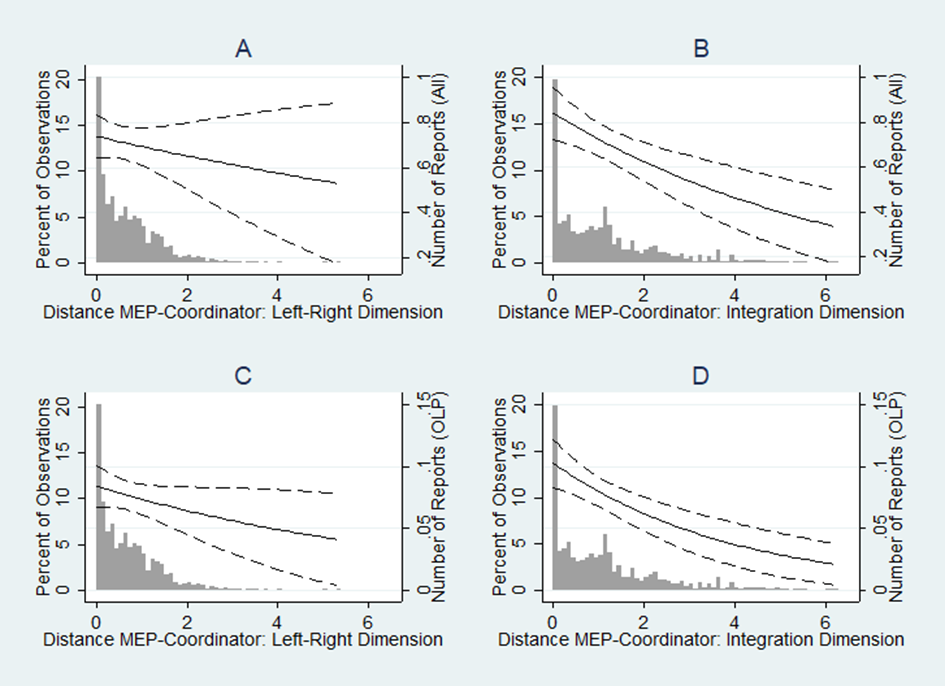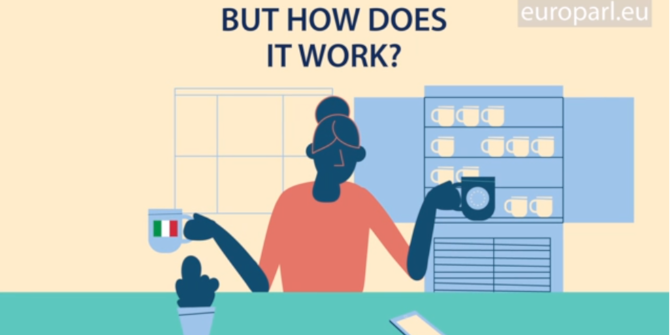

 Party group coordinators in the European Parliament are responsible for selecting ‘rapporteurs’, who have an important role in parliamentary committees. But how do coordinators make these decisions? Presenting findings from a new study, Lukas Obholzer, Steffen Hurka and Michael Kaeding illustrate that coordinators are more likely to select like-minded individuals as rapporteurs rather than MEPs who reflect the views of their party group, the composition of the committee, or the composition of the Parliament as a whole.
Party group coordinators in the European Parliament are responsible for selecting ‘rapporteurs’, who have an important role in parliamentary committees. But how do coordinators make these decisions? Presenting findings from a new study, Lukas Obholzer, Steffen Hurka and Michael Kaeding illustrate that coordinators are more likely to select like-minded individuals as rapporteurs rather than MEPs who reflect the views of their party group, the composition of the committee, or the composition of the Parliament as a whole.
Recent studies highlight the importance of rapporteurs for the legislative procedures in the European Parliament (EP). Rapporteurs are selected by party group coordinators which have to decide whom to please with their selection: their national party, their European party group, the committee or the Parliament as a whole. In a recent study, we use data from the 2009-2014 legislative term to demonstrate that EP party group coordinators tend to select rapporteurs who are close to their own national party’s ideal point on the integration dimension.
The selector: EP party coordinators
As focal points for their party group’s committee members, party group coordinators are individual legislators who are “effectively running the show” at the committee level of the EP. One of their central roles is the distribution of reports. Reports are usually distributed to party groups in an auctioning system, in which the coordinator bids for them with points allocated to the group according to its size. The coordinator then has the task of selecting a rapporteur from within the party group’s committee contingent.
By selecting rapporteurs, party group coordinators are crucial actors at the intersection of two complementary chains of delegation that characterise the legislative organisation of the EP (see Figure 1). On the one hand, the institutional chain of delegation runs from the plenary to the standing committees, which in turn delegate the tasks of drafting the EP’s position and representing the EP in inter-institutional negotiations to individual rapporteurs. In this chain, the rapporteur serves as the agent of the committee and by implication, of the plenary as a whole.
On the other hand, the rapporteur also serves as an agent of his or her transnational party group, that is as the final link in the partisan chain of delegation. Since rapporteurs enjoy a clear informational advantage when they engage in the formulation of the EP position due to their privileged access to policy-relevant information and their enhanced resources, agency loss is potentially an issue in both chains of delegation. Yet the extent to which agency loss actually occurs is strongly influenced by party group coordinators, who make the final call on who becomes rapporteur.
If we assume that party group coordinators are boundedly rational actors, this raises the question of who coordinators tend to choose: an MEP with preferences representative of their own national party, their party group, their committee or the EP plenary as a whole.
Figure 1: Two chains of delegation in the European Parliament
Note: For more information, see the authors’ accompanying study in European Union Politics
Merging rapporteurship allocation and positions
We formulated and tested four hypotheses corresponding to the four possible principals by merging data on rapporteurship allocation in the seventh EP term (2009-2014) with information on MEPs, coordinators, and their national parties’ positions. We draw on MEPs’ national parties’ policy positions from the Chapel Hill Expert Survey (CHES) as a measure of their preferences on the two key dimensions in EP policy-making: the general left-right dimension and EU integration dimension. We use this data combined with a range of control variables in a statistical analysis.
Then we analysed two dependent variables: the overall number of reports across all legislative and non-legislative procedures and the number of unique reports under the ordinary legislative procedure (OLP) that an MEP drafted. These two dependent variables allow for a more nuanced assessment of the dynamics of delegation and the robustness of the findings: while important and binding decisions are adopted under different procedures, including e.g. the budgetary and special legislative procedures, the OLP is a straightforward, widely used case in which we can expect the coordinator to be subject to more intense scrutiny by his or her principals when delegating the report to an MEP.
The results demonstrate that coordinators allocate more reports to MEPs close to their national parties’ – and thus arguably their own – preferences. This holds on the integration dimension for all types of reports as well as for OLP files, which lead to binding legislation.
Figure 2 illustrates the number of reports (with 95 per cent confidence intervals) that an MEP is expected to obtain per half term on any committee where he or she is a full member, depending on the distance between their own and the coordinator’s national party on the left-right (A, C) and integration (B, D) dimensions. Focusing on the integration dimension, a move from the minimum distance (national party match) to the maximum observed distance (6.22 on the integration scale), the predicted count of all reports an MEP receives falls by about 60 per cent from 0.84 to 0.33 (panel B). OLP reports are much rarer and more important prizes, given that they lead to binding legislation, so the expected counts are smaller, but the effects are stronger. Here, an MEP from the same national party as the coordinator is predicted to receive 0.1 reports, while an MEP at the maximum observed distance can only expect 0.02 reports – a stark 80 per cent drop (panel D). While based on extreme examples, as the histograms in the panels demonstrate, this suggests material, substantive differences.
Figure 2: Predicted number of reports (with 95 per cent confidence intervals and histograms)
Note: For more information, see the authors’ accompanying study in European Union Politics
The coordinator’s national party counts
Coordinators appear willing to exert discretion to minimize agency loss for their national party also in cases in which the EP has significant power and in which the rapporteur represents the EP in bicameral negations with the Council. In contrast, we do not find support for the alternative hypotheses according to which proximity to the EP plenary median, committee median or party group median would increase an MEP’s number of reports. Importantly, the findings hold on the integration dimension rather than the left-right dimension. Overall, these findings have important implications for EP decision-making, policy outcomes and our understanding of the roles of the party group coordinator and rapporteur in intra-party and intra-parliamentary delegation.
First, our findings shed light on the under-researched position of the party group coordinator in the EP committee system. While committee chairs and EP leadership positions come with more prestige and attract more attention, party group coordinators’ evident discretion in report allocation potentially has meaningful policy consequences. In allocating coordinator positions, party groups thus distribute influence over policy. The evidence that it is not the party group preference but the coordinator’s position that affects report allocation may lead national party delegations to reflect on the selection of coordinators.
Second, in terms of intra-parliamentary delegation, the apparently politicised selection of the rapporteur suggests that an understanding of the rapporteur as mere agent of the plenary may be an oversimplification. In fact, party groups have recognised the risk of agency loss in the delegation to the rapporteur and have instated shadow rapporteurs as checks on the rapporteur. Without the promise of policy benefits, it seems unlikely that coordinators would systematically choose MEPs close to their national parties’ ideal point. MEPs’ career paths as well as national-level considerations could affect the coordinators’ calculus. For instance, we might expect MEPs eyeing a long-term career in the EP to be particularly sensitive to their party group, while national elections might incentivise coordinators to allocate prominent reports to specific nationals.
Third, however, the findings do not necessarily imply a lack or failure of oversight within party groups. Indeed, the allocation of coordinators within a party group may amount to a trade in influence over different policy areas, allowing different national party delegations to shape policy in select fields.
For more information, see the authors’ accompanying study in European Union Politics
Please read our comments policy before commenting.
Note: This article gives the views of the authors, not the position of EUROPP – European Politics and Policy or the London School of Economics. Featured image credit: European Parliament (CC BY 2.0)
_________________________________
 Lukas Obholzer – Freie Universität Berlin
Lukas Obholzer – Freie Universität Berlin
Lukas Obholzer is a Senior Researcher at Freie Universität Berlin, Germany.
–
 Steffen Hurka – Ludwig-Maximilians-University Munich
Steffen Hurka – Ludwig-Maximilians-University Munich
Steffen Hurka is an Assistant Professor at the Geschwister-Scholl-Institute of Political Science at the Ludwig-Maximilians-University Munich.
–
 Michael Kaeding – University of Duisburg-Essen
Michael Kaeding – University of Duisburg-Essen
Michael Kaeding is a Professor in the Institute of Political Science at the University of Duisburg-Essen.







